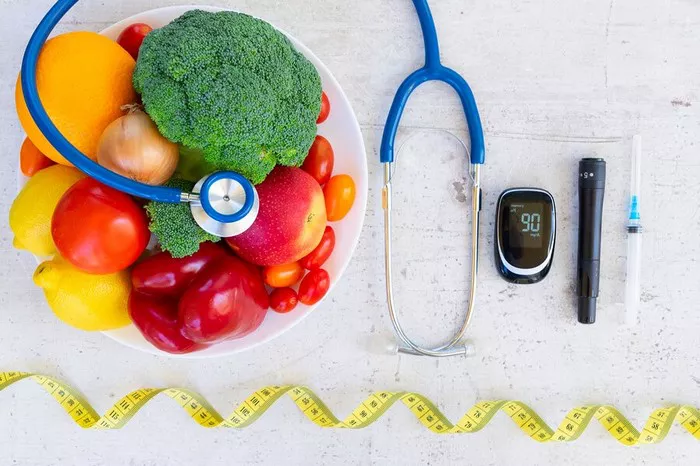Diabetes, particularly type 2 diabetes, has become a global health crisis, with millions of people affected by the condition. A significant contributing factor to the rise in diabetes cases is the modern diet. The foods we eat play a critical role in our overall health, and certain dietary choices can significantly increase the risk of developing diabetes, especially for those who are already at higher risk due to family history, obesity, or poor lifestyle habits.
In this article, we will explore which foods increase the risk of developing diabetes, why these foods are harmful, and how individuals can make informed choices to lower their risk of this debilitating condition. By understanding the link between diet and diabetes, we can take proactive steps to protect our health and improve our quality of life.
The Link Between Diet and Diabetes
Before delving into specific foods, it’s essential to understand how diet impacts diabetes risk. Type 2 diabetes is primarily characterized by insulin resistance, a condition where the body’s cells no longer respond properly to insulin, a hormone that regulates blood sugar levels. Over time, insulin resistance leads to higher levels of blood sugar, which can result in complications such as cardiovascular disease, kidney failure, and nerve damage.
Dietary choices that are high in refined sugars, unhealthy fats, and processed foods contribute to insulin resistance, inflammation, and weight gain, all of which increase the likelihood of developing diabetes. Conversely, a balanced diet that emphasizes whole, nutrient-dense foods can help maintain healthy blood sugar levels and reduce the risk of insulin resistance.
Foods That Increase the Risk of Diabetes
Certain foods are known to elevate blood sugar levels, promote insulin resistance, and contribute to inflammation. These foods should be consumed in moderation, especially by individuals at higher risk for developing diabetes. Here are some of the most concerning foods when it comes to diabetes risk.
1. Sugary Beverages
Sugar-sweetened beverages, such as sodas, energy drinks, sweetened teas, and fruit juices, are among the most significant contributors to diabetes risk. These drinks are high in simple sugars, particularly fructose, which is rapidly absorbed into the bloodstream and causes spikes in blood sugar levels.
One of the major issues with sugary beverages is that they provide little to no nutritional value. They are calorie-dense and can contribute to weight gain, particularly abdominal fat, which is closely associated with insulin resistance. Moreover, drinking sugary beverages can cause an increase in triglyceride levels, another risk factor for diabetes.
Research has shown a clear link between the consumption of sugary drinks and an increased risk of developing type 2 diabetes. A study published in the Journal of the American Medical Association found that individuals who consumed sugary drinks regularly had a 25% higher risk of developing type 2 diabetes compared to those who avoided them.
Why These Foods Are Harmful:
-
Cause rapid spikes in blood sugar and insulin levels
-
Contribute to weight gain and abdominal fat, which increases insulin resistance
-
Lack essential nutrients and offer empty calories
2. Refined Carbohydrates
Refined carbohydrates, such as white bread, pastries, pasta, and many baked goods, are made from processed grains that have been stripped of their fiber and nutrients. These foods have a high glycemic index (GI), meaning they are quickly digested and absorbed, leading to sharp increases in blood sugar levels.
When refined carbohydrates are consumed, they cause a rapid spike in glucose, followed by a crash in energy levels. Over time, regular consumption of high-GI foods can lead to insulin resistance, as the body’s cells become less responsive to the insulin needed to process the excess sugar in the blood. This contributes to the development of type 2 diabetes.
In addition to their effect on blood sugar, refined carbohydrates are typically low in fiber, a nutrient that helps regulate blood sugar levels and improve digestion. Fiber slows the absorption of sugar into the bloodstream, preventing sudden spikes in blood glucose. By replacing refined carbohydrates with whole grains, individuals can help reduce their risk of diabetes.
Why These Foods Are Harmful:
-
Quickly raise blood sugar levels and increase insulin demand
-
Promote insulin resistance when consumed regularly
-
Lack fiber, which is essential for stabilizing blood sugar
3. Fried Foods
Fried foods, such as French fries, fried chicken, and battered fish, are high in unhealthy fats, particularly trans fats, which are known to promote inflammation and insulin resistance. These foods are typically cooked at high temperatures, which can lead to the formation of advanced glycation end products (AGEs), compounds that can damage cells and tissues and contribute to the development of diabetes.
Trans fats, which are commonly found in fried foods and some processed snacks, are particularly harmful because they not only increase insulin resistance but also contribute to the buildup of visceral fat, the type of fat that accumulates around internal organs. This type of fat is closely linked to metabolic disorders, including diabetes.
In addition to being high in unhealthy fats, fried foods are often coated in refined carbohydrates, further contributing to the blood sugar spikes that increase diabetes risk. The combination of unhealthy fats and refined carbs makes fried foods a particularly dangerous choice for individuals at risk for diabetes.
Why These Foods Are Harmful:
-
Contain trans fats, which promote inflammation and insulin resistance
-
Lead to the accumulation of visceral fat, increasing diabetes risk
-
High in calories and contribute to weight gain
4. Processed Meats
Processed meats, such as bacon, sausages, hot dogs, and deli meats, are packed with unhealthy fats, sodium, and preservatives, all of which can negatively impact blood sugar regulation. These meats are often high in saturated fats, which can contribute to insulin resistance and increase the risk of developing type 2 diabetes.
Furthermore, processed meats are typically high in sodium, which can contribute to high blood pressure and increase the risk of cardiovascular disease, a common complication of diabetes. Some studies have suggested that the consumption of processed meats may also increase the risk of developing cancer, particularly colorectal cancer, which further underscores the health risks associated with these foods.
In addition to their impact on blood sugar and insulin resistance, processed meats are also linked to weight gain. The high fat and calorie content of processed meats can lead to the accumulation of fat, particularly abdominal fat, which is a significant risk factor for insulin resistance and diabetes.
Why These Foods Are Harmful:
-
High in unhealthy fats and sodium, which contribute to insulin resistance and high blood pressure
-
Increase the risk of weight gain and abdominal fat accumulation
-
Linked to other health risks, including cancer
5. Baked Goods and Pastries
Baked goods such as cakes, cookies, doughnuts, and pastries are often made with refined sugars, white flour, and unhealthy fats, all of which can increase the risk of developing diabetes. These foods are high in calories and provide little nutritional value. The refined carbohydrates in baked goods are quickly broken down into glucose, causing blood sugar spikes and contributing to insulin resistance.
In addition to being calorie-dense and low in nutrients, baked goods are often high in added sugars, which further exacerbate the risk of developing diabetes. Regular consumption of foods high in sugar and refined carbohydrates can lead to obesity, metabolic syndrome, and insulin resistance, all of which are key factors in the development of type 2 diabetes.
Why These Foods Are Harmful:
-
High in refined sugars and unhealthy fats
-
Promote rapid increases in blood sugar levels and insulin resistance
-
Contribute to weight gain and obesity
6. Sweetened Breakfast Cereals
Many commercially available breakfast cereals are loaded with refined sugars and have little to no fiber. While they may seem like a quick and convenient breakfast option, these cereals can cause a rapid rise in blood sugar levels, leading to insulin resistance over time. Even cereals labeled as “whole grain” can be deceptive, as many contain added sugars and other unhealthy ingredients that undermine their nutritional value.
The combination of sugar and refined grains in sweetened cereals leads to the same blood sugar spikes and crashes that are associated with other processed foods. Over time, this can result in the development of insulin resistance and an increased risk of diabetes.
Why These Foods Are Harmful:
-
High in refined sugars and low in fiber
-
Rapidly increase blood sugar levels and contribute to insulin resistance
-
Often marketed as healthy, but contain unhealthy additives
7. Candy and Sweets
Candy, chocolate bars, and other sugary snacks are packed with refined sugars, unhealthy fats, and artificial additives. These foods provide a quick source of energy, but they also lead to blood sugar spikes and insulin resistance when consumed regularly. While an occasional treat may not pose significant harm, consuming these foods frequently can have a cumulative effect on blood sugar regulation.
In addition to their effect on blood sugar, sugary candies and sweets contribute to weight gain, especially when consumed in large quantities. The excessive calorie content of these foods, combined with their lack of nutritional value, can lead to obesity, a major risk factor for diabetes.
Why These Foods Are Harmful:
-
High in refined sugars and unhealthy fats
-
Lead to blood sugar spikes and insulin resistance
-
Contribute to weight gain and obesity
Reducing the Risk of Diabetes Through Dietary Changes
To lower the risk of developing diabetes, it is important to make healthier dietary choices. Replacing processed foods with whole, nutrient-dense options can help regulate blood sugar levels, improve insulin sensitivity, and support overall metabolic health. Here are some dietary changes that can help reduce the risk of diabetes:
Increase Fiber Intake: Foods that are high in fiber, such as vegetables, fruits, whole grains, and legumes, help regulate blood sugar levels and improve digestion. Fiber slows the absorption of glucose into the bloodstream, preventing sudden spikes in blood sugar.
Choose Healthy Fats: Opt for healthy fats, such as those found in avocados, nuts, seeds, and olive oil. These fats can improve insulin sensitivity and help reduce inflammation in the body.
Limit Processed Foods: Processed foods, such as sugary snacks, fried foods, and refined carbohydrates, should be limited in favor of whole, minimally processed foods. Cooking at home using fresh ingredients gives you more control over what goes into your meals.
Balance Macronutrients: Aim to balance carbohydrates, protein, and fat in each meal to prevent blood sugar imbalances. This can help keep insulin levels stable and reduce the risk of insulin resistance.
Stay Hydrated: Water is the best beverage for staying hydrated and regulating blood sugar levels. Avoid sugary drinks, and opt for water, herbal teas, or black coffee instead.
Conclusion
The foods we eat play a significant role in our overall health, including our risk of developing type 2 diabetes. Consuming sugary beverages, refined carbohydrates, fried foods, processed meats, and baked goods regularly can increase the risk of diabetes by promoting insulin resistance, weight gain, and inflammation. Making healthier dietary choices, such as eating more whole foods, increasing fiber intake, and choosing healthy fats, can help reduce the risk of diabetes and improve metabolic health.
Related topics:
How Often Should You Eat with Gestational Diabetes?





















